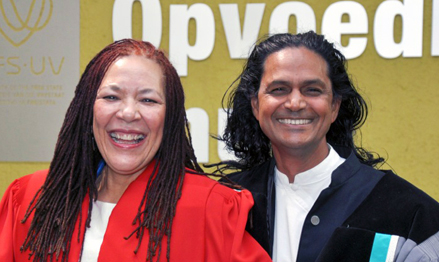Latest News Archive
Please select Category, Year, and then Month to display items
31 January 2024
|
Story EDZANI NEPHALELA
|
Photo ANJA AUCAMP
 Dr Martin Laubscher’s thesis, crowned with the Andrew Murray-Desmond Tutu Prize, is testament to the university’s unwavering commitment to scholarly excellence.
Dr Martin Laubscher’s thesis, crowned with the Andrew Murray-Desmond Tutu Prize, is testament to the university’s unwavering commitment to scholarly excellence.
In a historic triumph that reverberates over four decades since its inception, the UFS has clinched the coveted
Andrew Murray Prize – now renamed the Andrew Murray-Desmond Tutu Prize – for the first time. Standing shoulder to shoulder with institutions such as the University of Pretoria (UP) and Stellenbosch University (SU), this achievement marks a significant milestone in the UFS’ journey.
At the heart of this accomplishment lies the profound contribution of
Dr Martin Laubscher, distinguished Senior Lecturer specialising in Practical and Missional Theology in the
Faculty of Theology and Religion. Dr Laubscher’s dedication and scholarly prowess culminated in the groundbreaking work titled
Publieke teologie as profetiese teologie? (Public theology as prophetic theology), a revised edition of his doctoral thesis, which was originally crafted at Stellenbosch University in 2020, with a focus on the eminent Karl Barth.
Dr Laubscher received the Andrew Murray Prize for Theological Books in Afrikaans for his research and insightful analysis. The journey started when he realised, under the guidance of his study leader,
Prof Dion Forster, that his script had the potential to be published in Afrikaans. Sun Media’s interest in publishing this work in Afrikaans, led to it being the first-ever published thesis in Afrikaans. Dr Laubscher recalls, “I was grateful and excited about Sun Media’s interest. The book emerged within a year, and during a celebratory launch Prof Forster suggested I submit it for the Andrew Murray Prize.”
Earlier this year, Dr Laubscher was excited to learn that he was being shortlisted for the prestigious award. Reflecting on the significant moment, he shares, “The elation I felt upon receiving the news was unparalleled. I was not only celebrating a personal triumph, but also etching my name as the first laureate from our faculty to secure this prestigious accolade.”
Rhodes professor calls for accountability in teacher education
2013-11-14
|
 |
Prof Jean Baxen of Rhodes University and Prof Dennis Francis, Dean of the Faculty of Education of the UFS.
Photo: Stephen Collett
15 November 2013 |
Lecture (pdf)
“Our education system needs quality teacher education.”
This was the message from Prof Jean Baxen, Deputy Dean of Research at Rhodes University in Grahamstown. She delivered the Education Public Lecture on ‘The lives of children, citizenship and teacher education: challenges and opportunities’ at the University of the Free State’s Bloemfontein Campus.
Growing up in White River, the rural areas of Eastern Transvaal (as it was previously known), Prof Baxen took the audience on a journey of the imagination. She shared stories of how she and fellow learners walked miles to get to school and how her son found himself in a situation of being unsure about his own racial identity, questioning what it meant to be ‘coloured’. She also related stories of how teachers are not sufficiently prepared to mediate information on HIV/Aids.
These stories revealed how little teachers cared, and also how difficult and challenging it is for learners to cope in such teaching and learning environments – thus calling for quality teacher education.
She stressed the fact that quality teacher education is needed in South Africa to assist in curbing the challenges children and fellow citizens come across in our broader society. “It is important that, as teacher educators, we should groom teachers to find and understand their identity, sexuality, and also the world they live in. There is an urgent need for us to hold ourselves and others accountable and to not distance ourselves and make it someone else’s responsibility – it is our joint responsibility as citizens,” she said.
We need a pedagogy that would navigate and start formulating a language that we could use to face these challenges, she proposed.